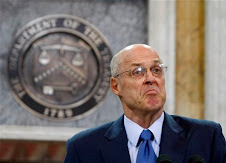The Wall St. Bailout: A Socialist Perspective
A Statement of the National Executive Committee of the
Committees of Correspondence for Democracy and Socialism
Oct. 3
Under extreme pressure The House of Representatives has just passed a revised more than $700 billion bailout bill that contains tax cuts for businesses and individuals, an increase in coverage of insurance on deposits, a few provisions of social value, and a bevy of “sweeteners” for politicians running for reelection. The bill makes a vague promise that the Treasury Secretary now has the “authority” to use some funds to “help homeowners” But for the million who have already been foreclosed or millions more facing loss of their homes, prospects remain very grim. The legislation also does nothing to cap outrageous CEO salaries and guarantees nothing for besieged taxpayers.
Rep. Dennis Kucinich continues to ask the right questions: “Why have we not considered any alternatives other than to give $700 billion to Wall Street? Why aren’t we asking Wall Street to clean up its own mess? Why aren’t we passing new laws to stop speculation, which triggered this? Why aren’t we putting up new regulatory structures to protect investors? How do we even value the $700 billion in toxic assets? Why aren’t we helping homeowners directly with their debt burden? Why aren’t we helping American families faced with bankruptcy? Why aren’t we reducing debt for Main Street instead of Wall Street?”
On the same day when the loss in September of an additional 159,000 jobs was announced (added to 605,000 already lost this year) Democratic leaders tacitly admitted the legislation’s failures, promising to come back next year with presumably larger Democratic majorities and a Democratic White House to enact a major stimulus package to restart the economy. The Democrats also promised to investigate Wall Street with the aim of enacting punitive measures. The Democrats, and all elected officials, must be urgently held to that promise.
A comment in a Boston Globe report on September 30 remains valid: “Even after the federal government starts buying mortgage-related assets…the fundamental weakness of the US economy will remain, including distressed housing markets, deteriorating labor markets, and faltering consumer spending as families struggle under heavy debt, high prices for food and energy and uncertainty about their jobs.” Emergent homeless tent cities across the country underscore the tragedy and urgency of the growing crisis.
The crisis for working people is real. The need for action requires the united voices of opposition across social, political and geographical lines that brought down the original bailout bill. The urgent need now is for action to stop the hemorrhaging of jobs, to complete the extension of unemployment insurance just voted by the House, to deal forcefully to stop home foreclosures and to address the needs of the public with the same vigor that was exercised to address the finance industry’s credit crisis.
Capitalism is the Root Cause of the Crisis
John McCain and right wing members of Congress have uncharacteristically launched an assault on Wall Street venality and corporate greed. They ignore their own duplicity in deregulation that led to victimizing millions and their own demands for more tax breaks on capital gains and overseas profits. Their new pseudo-populism among other things is aimed at papering over their fears of “creeping socialism.” Glen Beck, CNN’s right wing talking head declared that “Greed, not capitalism, is the cause” of the crisis, declaring the system out of bounds for dissection and challenge.
Greed and mindless criminal behavior on Wall Street merit the condemnation of an outraged public. While greed is crucial, blaming it for the current crisis is like blaming a lighted match for blowing up a gas-filled room while ignoring the gas that been accumulating for a long time. The root cause is capitalism itself and not since the Great Depression have so many begun to turn a critical eye towards “free market fundamentalism” and towards capitalism.
The lifeblood of value from which profit is derived is labor. But labor under capitalism is never compensated at its full value. While the price of labor is determined by what is required for its survival and by its own struggles for a greater share of the value it creates, capital seeks through exploitation to appropriate the value that remains which becomes the source of profit in commodity exchange. The wealth created by production must inevitably overproduce, because the vast majority that labors is unable to recoup the full production that it generated. The result is cyclical crises that last until overproduction is expended or until new productive needs emerge.
In recent decades, capitalism has staved off crisis by government spending (from taxes taken significantly from workers) and by extending credit (from which additional profits are gained from interest payments). This works for a while, but the underlying contradictions inevitably surface and periods of recession and depression commence. Cyclical crises are driven also by competition that forces capitalists to buy new equipment to reduce costs of production and maintain or raise profits. A fundamental aim is to reduce wage costs and benefits, further deepening the cyclical crisis and wreaking havoc on workers and small businesses that serve them.
Labor, the source of wealth is allowed only a fraction of what it creates. That remains the core contradiction at the heart of capitalism – and at the heart of the present calamity.
In the long run, costly military production aggravates the crisis. It fails to generate new value and drags down the overarching civilian economy that increasingly needs new investment to sustain its vigor. Adding to capitalism’s growing profit problems are looming environmental catastrophe and the shrinkage of existing energy sources, especially oil and its escalating price.
In the late sixties and early seventies, the end of an extended post World War II expansion loomed. Facing serious debt and balance of international payments problems due to enormous outlays for the Vietnam War, Richard Nixon took the United States off the gold standard, letting the dollar float on world markets, opening the door to intensified global economic competition and currency speculation. Nixon’s action upset the mechanisms put in place at the Bretton Woods conference during World War II to assure stability in global economic relations and assure the dominance of the victorious industrial powers.
During that period, the problems and contradictions of capitalism deepened. Major industrial sectors virtually shut down as capitalists sought to minimize falling rates of profit by shifting production to low wage countries with tax policies strongly favorable to business and hostile to labor unions. For large numbers of workers, well-paying industrial jobs were replaced by low wage, non-union service employment.
For the industrial production that remained, labor was subjected to a major assault on unionization by industry and government underscored by Ronald Reagan’s destruction of the air traffic controllers’ union in 1981. With a sharp decline in union protections and the freezing of union growth, wages stagnated and declined while labor was pressed to greater productivity often under the threat of shutdowns and removal to low wage countries.
With globalized production, major corporations and government turned their backs on domestic support for education, health care and social services for working people, contributing to a decline of schools, to deteriorating cities and to serious neglect of the nation’s infrastructure. At the same time, those with economic and political power exalted individual greed for the rich while preaching a doctrine of “personal responsibility” for the working class, capping welfare benefits, marginalizing the poor and the unemployed and creating a growing prison-industrial complex embedded in racism.
With the weakening of the industrial structure, the financial system became capitalism’s cash cow. Traditionally, credit has functioned as an engine to start and sustain enterprise and compensate for the inability of labor to buy back all it creates. Capitalists paid interest on credit by turning over a portion of value created by labor to financial institutions. Today, a “financial industry” has overshadowed the real production of goods. Riding a tide of “free market” deregulation, exchanges of speculative paper have become the sources of dizzying fortunes – fortunes that created no new wealth but are the fruit of cynical ponzi schemes that ultimately squeeze out of the working and middle classes whatever is left of their resources.
The sub-prime mortgage crisis is a searing example of the crude exploitation that characterizes the “finance industry.” Millions of people, many who qualified for “prime” mortgages, were steered to mortgages designed to trigger impossibly high interest, while making huge fees for brokers and lenders.
Those mortgages were packaged into “mortgage-backed securities,” sold repeatedly worldwide at ersatz profit, spreading the poison through he global financial structure. That has added to the already oppressive nature of globalized capitalism whose “race to the bottom” in search of maximal profits has burdened much of the developing world with intractable debt, forced reduction of social spending at the behest of the International Monetary Fund, and acquiescence in the intense exploitation of their own national labor. All that has accelerated disease, hunger and grinding poverty – widening the massive disparity between rich and poor on a world scale.
Ultimately, the growing impoverishment of millions of working people combined with the crooked nature of the sub-prime market, caught up with Wall Street’s speculative binge, causing the present crisis. The credit system again proved ultimately incapable of cushioning the inherent contradictions of capitalism – an exploited labor force without the resources to sustain the system.
Without incessant protest and demand from an aroused public, the interests of the finance industry will continue to be aggrandized. And the crisis will only deepen. The mortgage crisis actually pales in comparison to credit card debt that runs into trillions of dollars. The political moment demands action.
The Immediate Need: Fund the People, not Wall Street
CCDS joins with a range of progressive organizations and movements that have made proposals to effectively deal with the immediate crisis – beyond the deeply flawed legislation just passed by Congress and signed by the President.
Forecloses must be halted. Bankruptcy courts must be allowed to restructure mortgages and lenders must be required to refinance mortgages as lower, fixed rates.
Wall Street and the super rich must pay for their own bailout. CEO salaries and golden parachutes must be sharply reined in. A wealth surcharge on incomes over ten million dollars would add 300 billion dollars to the treasury. A sales tax on Wall Street trade in stocks of one penny for every four dollars invested would yield one hundred billion dollars a year.
Those funds should jump start a massive program to repair the nation’s infrastructure and launch a green alternative energy program that will create millions of new jobs. Unemployment benefits must be increased and retraining programs launched. Nothing less than a "New New Deal" is required to address the financial stress facing working people.
Wars in Iraq and Afghanistan must end; military spending must be reduced; the billions saved should be plowed into jobs, and social services green energy development and infrastructure improvements.
The costs of health care constitute the greatest single source of financial strain on working people. Universal single payer health insurance must be enacted.
We urge that the principal contours of this program be advanced and forcefully enunciated in the crucial election campaign by Barack Obama and progressive candidates at all levels.
CCDS takes special note of the impact of the crisis on the country’s African American population and other oppressed nationalities. The historic patterns of segregated housing through “red lining” and other practices have left many African Americans with few alternatives than to accept sub-prime mortgages to escape forced sub-standard housing. That factor, combined with the growing depressed economic circumstances of African Americans and replicated in other communities of color has contributed to extensive stripping of the financial resources of those communities. An end to targeted racist policies should be a central demand for relief from the ravages of the present crisis.
Socialism: The Ultimate Answer
CCDS believes that the ultimate solution to the crisis requires the elimination of capitalism and the institution of a political and economic system founded on democratic principles of service to the needs and interests of the working majority for good of society as a whole.
The starting point for the democratic socialist reconstruction of society can begin with the nationalization of banking and all financial services. That demand is embedded in the nation’s political tradition. The Populists advanced it in the late 1890s and the early 20th century Socialist Party advocated it. They were motivated by a profound belief that the nation’s credit and finances, created by labor, should be democratically owned and controlled by working people to build and sustain material production, education, health care, housing and food for the good of all. That essential principle is more valid than ever.
Nationalization of energy, oil in particular, should also be a foundation for the democratic and socialist revitalization of society. The earth’s natural resources rightfully belong to all. The corporate owners of energy have demonstrated their inability by nature of their class interest to utilize the massive wealth created by those industries to confront the environmental crisis and to curb their super profits to benefit society. Basic social and economic problems at this juncture cannot be solved without nationalization of energy.
With those foundations of social ownership established, working people can explore other forms of ownership that can end capitalism’s insoluble contradictions and chart a course for national and global security, peace and justice.
CCDS is committed to explore, educate and organize for a socialist vision and socialist reality as the historically mandated road to a better life for all humanity.
A Final Word: The Coming Elections
The combined impact of financial crisis, threatened environmental catastrophe, growing unemployment, rising inflation of food costs and health care is a tsunami of storms that will confront a new administration in 2009.
That gathering crisis also engenders an historic opportunity to advance major change – to prioritize the needs of the working majority, to forge a master plan to rebuild the country, create millions of green jobs, advance education and health care, end the wars and launch a new constructive multilateral foreign policy. That requires both the immediate need to defeat the far right and John McCain. It also requires the broadest unity of all forces for progress, left and center to build a powerful bottom-up consensus for progressive change without which a new administration could not advance major change against the power of entrenched corporate interests.
In the midst of darkness, the light of progress can shine through. It is up to all working people and their allies to make that progress possible and everlasting.
National Executive Committee
CCDS
Charlene Mitchell
Mark Solomon
Mildred Williamson
Renee Carter
Marian Gordon
Michael Kaufman
Duncan McFarland
Ted Pearson
Harry Targ
Steve Willett
Advisory Committee
Timuel D. Black
Professor (emeritus) City College of Chicago
Noam Chomsky
Professor, MIT
Angela Davis
Author, Professor, Activist
Ruby Dee
Actress, poet, playwright
Donna DeWitt
President, South Carolina State AFL-CIO
Elaine Hagopian
Professor of Sociology, Simmons College
Connie Hogarth
Cofounder, former Executive Director of WESPAC C. Hogarth Center for Social Action, Manhattanville College
Manning Marable
Director Institute for Research in African-American Studies, Columbia University
Elizabeth (Betita) Martinez
Director, Institute for MultiRacial Justice
Eugene "Gus" Newport
Former Mayor of Berkeley
Jack O'Dell
Movement organizer, journalist, foreign policy specialist
Pete Seeger
Musician, writer, environmentalist
Toshi Seeger
Environmentalist, grandmother
Don White
CISPES - L.A.
Download "Health Care Talking Points" brochure, for copying and distribution.
Download PDF






















 Delicious
Delicious Digg
Digg StumbleUpon
StumbleUpon Propeller
Propeller Reddit
Reddit Magnoliacom
Magnoliacom Newsvine
Newsvine Furl
Furl Facebook
Facebook Google
Google Yahoo
Yahoo Technorati
Technorati





